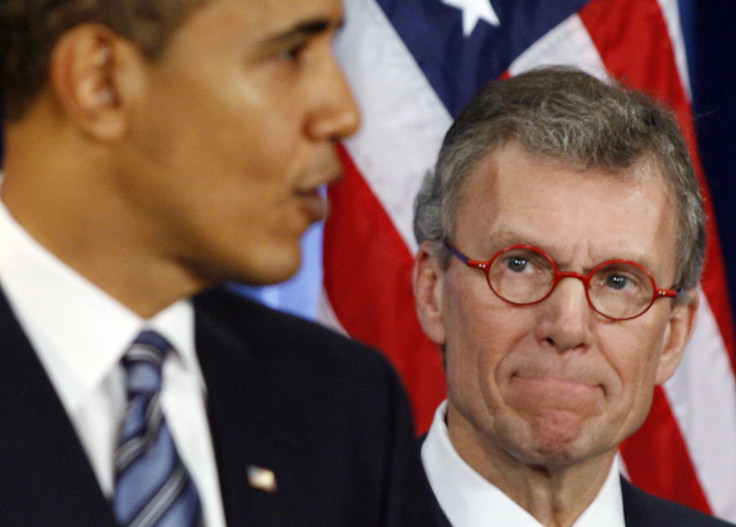Aetna Hires Tom Daschle, Other Former Government Officials, As Feds Consider Its Merger With Humana

Eleven years after leaving his post, former Senate Majority Leader Tom Daschle registered to lobby for the first time in February, filing paperwork to solely represent insurance giant Aetna. Daschle’s hiring comes at a particularly important time: Aetna has enlisted an army of former government officials-turned-lobbyists just as the company is asking the Justice Department to approve a controversial $37 billion merger with fellow insurance giant Humana.
As watchdog groups warned that the merger could increase premium prices and violate antitrust laws, Aetna — which posted $60.3 billion in total revenue last year — spent a total of $4.1 million lobbying the federal government, including the office of the president, during 2015. As part of that lobbying effort, the company spent $3 million on lobbying by its own officials, and federal records show it employed a total of 25 former federal officials as lobbyists in 2015 — including many who worked on legal and antitrust issues during their time in government. In all, employees of Humana, Aetna and Aetna's outside lobbying firms have delivered more than $1.4 million worth of campaign contributions to Barack Obama's presidential campaigns, according to data compiled by PoliticalMoneyLine.com.
Federal records show that since mid-2015 — when the proposed Aetna-Humana merger was first announced — Aetna spent $460,000 to sign up five outside lobbying firms whose federal records list the merger as an issue they are working on. Those five firms list 15 former government officials-turned-lobbyists working for Aetna in 2015.
According to federal lobbying records, that includes Seth Bloom, a former general counsel for the Senate antitrust subcommittee; Deborah Pryce, a former Republican congresswoman and House Republican Conference chairwoman; Joseph Gibson, a former counsel in the Justice Department’s antitrust division; Malloy McDaniel, a former top aide to Senate Majority Leader Mitch McConnell; Kristi Remington, a former deputy attorney general in George W. Bush’s administration; Cindy Brown, a former chief of staff to Wisconsin Democratic Rep. Ron Kind; and Mike McKay, a former aide to New York Democratic Rep. Greg Meeks.
Capping off that hiring blitz was news that the company’s overall lobbying efforts will be aided by Daschle, a Democratic power broker with close ties to the man at the top of the regulatory approval process — President Obama.
Daschle, a former Senate majority leader who left the legislative body in 2005, was one of the first backers of Obama’s 2008 run for president and provided a considerable amount of authority to the political newcomer’s campaign. He urged the then-senator to run for the White House in the first place and served as a behind-the-scenes liaison between senators and the campaign, ultimately playing an important role in upsetting then-Sen. Hillary Clinton’s support among the political elite. Daschle’s support resulted in a nomination to the president’s cabinet in 2009, as secretary of Health and Human Services, but he later withdrew his name amid concerns that he hadn’t fully paid his taxes. He opened a lobbying firm, the Daschle Group, just over a year ago, but didn’t register as a lobbyist until February.
In his registration as an Aetna lobbyist, Daschle did not mention the merger specifically, and the Daschle Group issued a statement to International Business Times asserting that the merger "is not in the scope of our representation." The filings of the other five outside firms — Bloom Strategic Counsel, CGCN Group, West Front Strategies, Empire Consulting Group and the Gibson Group — mention the merger. Federal records show Aetna also employed four other lobbying firms on general healthcare policy matters.
Opponents of the Aetna-Humana merger include the American Medical Association and the Center for American Progress, a left-of-center think tank. A study conducted by CAP found that premiums are significantly cheaper for Medicare Advantage customers in counties where the companies compete, compared to those where just one provider is present. And, for seniors, the competition between the two lowers insurance premiums for Aetna and Humana by $302 and $43, respectively. The AMA contends that it would run afoul of antitrust guidelines in some states and says that at least half of the states in the U.S. could see reduced competition.
Supporters of the merger, including Aetna’s home state of Kentucky, which gave its official approval in February without public input, argue that it would have little impact on premiums and could improve efficiency and therefore lower costs.
© Copyright IBTimes 2025. All rights reserved.






















